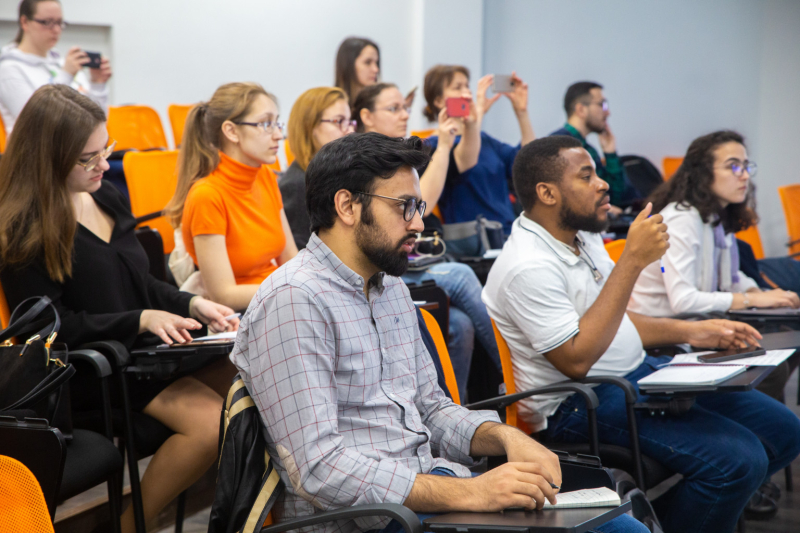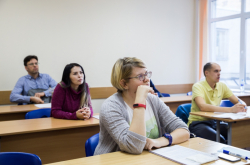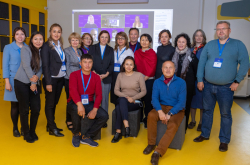What is EMI?
EMI or English as a Medium of Instruction is a system of methods and techniques developed for lecturers in international educational programs for whom English isn’t a native language.
It is also a popular research topic, with many published articles and even a special dedicated group at the University of Oxford. In recent years, EMI practices have been adopted worldwide, especially at leading universities of Asia and Latin America.
The main idea behind EMI is to see English as a tool, not as an obstacle, and follow several rules in order to efficiently apply it. According to the EMI standards, at least 70% of all interactions between students and the lecturer, as well as among students, has to be conducted in English. It is advisable to take this criterion into account when forming student groups – ideally, students shouldn’t be using their native language during collaborative tasks. Another rule to follow is active student engagement through discussions, group projects, interesting tasks, etc.
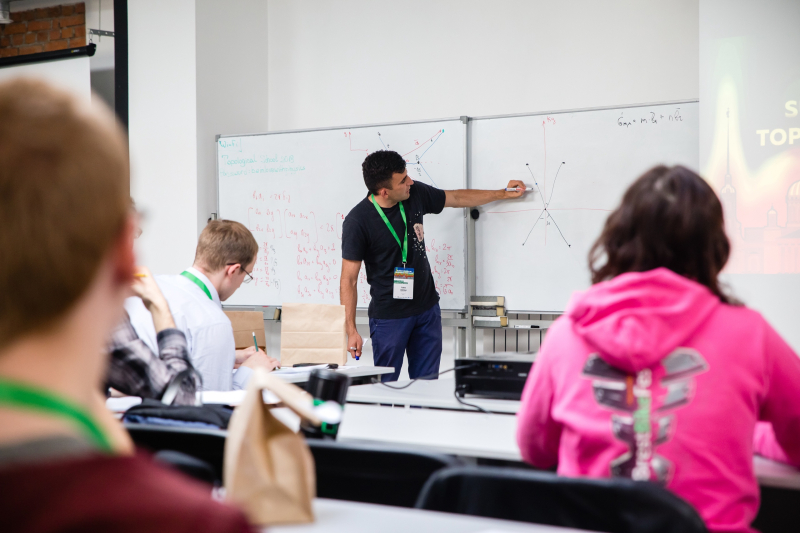
Photo by ITMO.NEWS
The perks of EMI
In 2009, a study by John Airey, a physicist from Stockholm University, demonstrated that teachers tend to speak more slowly during classes in a non-native language, while the students’ concentration rates fall accordingly. It was challenging for participating students to keep up with lectures in a non-native language and take notes at the same time.
Many usual teaching practices become impractical in such scenarios, which means that many course materials have to be adapted to accommodate for the challenges. That’s where EMI comes to the rescue.
EMI: the methods
According to Alexandra Shparberg, the head of methodology at ITMO’s Foreign Language Training Center and curator of the EMI course, the secret to the whole approach is good teaching. This means relying on modern technologies and active student engagement – a principle that just as easily applies to teaching in one’s native language.
EMI focuses on making course materials most useful for efficient learning in a foreign language:
“Sometimes you can pay less attention to various engagement techniques when teaching a course in your native language, but they become crucial in an EMI scenario. An active approach to learning and small discussions during class are necessary to help students understand and retain the information they learn. Some other techniques we train teachers to apply are making lists of key terms and preparing their slides in a specific way to turn them into a language aid for students,” shares Ms. Shparberg.
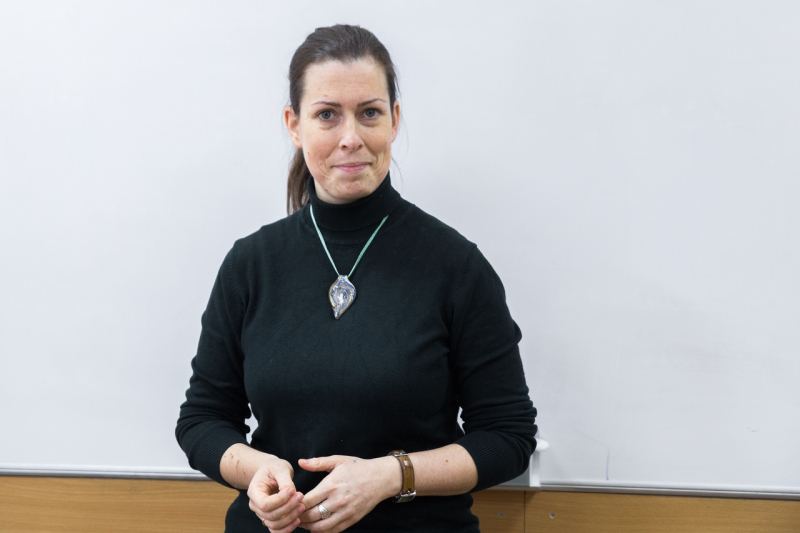
Alexandra Shparberg. Photo by ITMO.NEWS
EMI at ITMO
ITMO first started teaching EMI in 2017, after several of its staff completed an EMI program at the University of Arizona. Since then, ITMO’s own course on EMI has been taken by 60 lecturers from cities all across Russia, including Vladivostok, Tomsk, Irkutsk, Krasnodar, Yakutsk, and Rostov-on-Don. Some universities even sent whole groups of lecturers to learn EMI.
The course, which can be taken entirely online, was recently moved to the new online.itmo educational platform. It takes around four months to complete (comprising 120 credit hours in total), and includes both lectures and practical classes. Every participant is assigned homework, culminating in the final project – a simulated lesson in the trainee’s subject, which has to include all of the methods and tools that are covered by the course.
The next iteration of the course starts in March, while the final projects are set to be completed by the end of June – these deadlines were selected so as to not take up the trainees’ time during university exams. You can apply for the course via its page on the online.itmo platform. As your English level has to be at least B2 (upper-intermediate) to be admitted, you are required to take a test. A certificate is awarded only if all practical classes are attended.
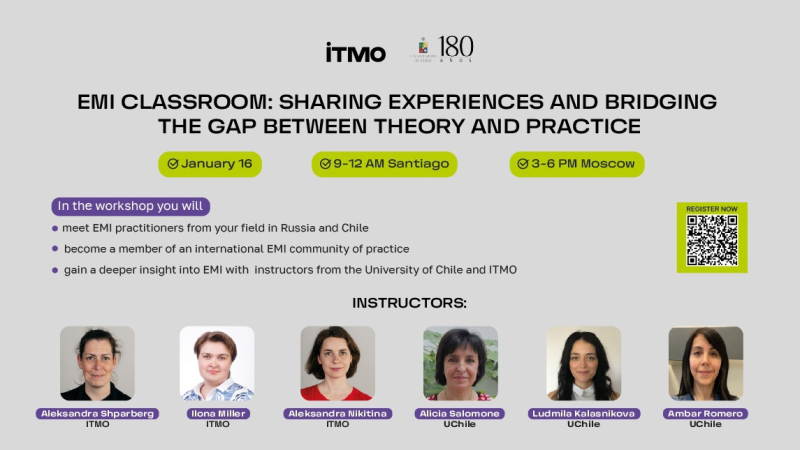
The online course by ITMO University and University of Chile. Credit: vk.com/itmoemi
See also:
ITMO.Online: ITMO Launches its Own Learning Platform
ITMO.EduStars Winner Yulia Artemenkova on How to Make Learning English a Habit
How to Teach in English: EMI Teacher Training Course for Lecturers of Russian Universities
The international community
The team behind the EMI course is part of an international community of educators. ITMO University’s staff regularly take part in industry conferences in order to keep their techniques up-to-date, learn from their colleagues’ experience, and share their own results and observations (in particular, they are interested in researching how the lecturers change their teaching methods after learning EMI). The latest among such events was ICLHE (Integrating Content and Language in Higher Education), an annual conference which in October 2022 took place in Maastricht, Netherlands. There, ITMO staff met their colleagues from the University of Chile – Alicia Salomone and Ludmila Kalasnikova. This meeting led to a new partnership:
“At the conference, our colleagues were speaking about their training course for lecturers, and we instantly realized our courses matched. They are similar in content and structure, both using the same approaches and facing the same issues – we felt like there was room for collaboration there. So we immediately contacted them and offered to collaborate on a workshop,” says Alexandra Shparberg.
The workshop was held in mid-January. Specialists from both universities shared their know-hows and techniques while discussing the difficulties their students had when studying in a foreign language. The main event was a lecture by Rob Baird and Mary Page, authors of the most prominent online EMI course – they spoke about creating practical tasks that are capable of immersing the students into the subject matter while helping them to break the language barrier.
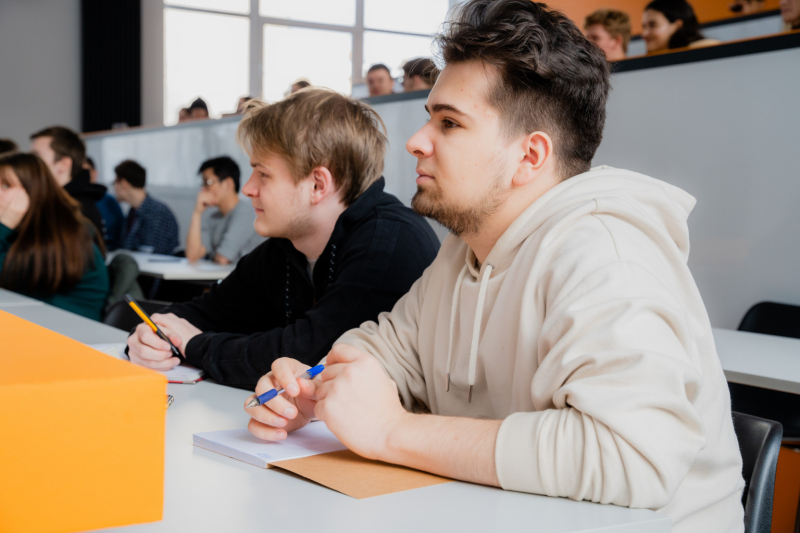
Photo by ITMO University
A platform for growth
According to its organizers, the main outcome of the workshop was the launch of a platform for a community of practice. There, the organizers published a database with all the recorded lectures, group classes for specific subjects, and guest talks, as well as supplementary materials. The platform also houses a forum where participants can communicate, exchange experiences, and ask questions to instructors.
Currently, the platform is only available to participants of the workshop, but anyone interested in joining it will get the chance to do so by signing up for the next EMI event, to be held in April. You can follow the updates on this VK page. The organizers welcome newcomers and former graduates of ITMO’s EMI courses.
In the spirit of promoting international collaboration, ITMO’s experts are planning to present the results of their workshops at the next ICLHE conference. According to Alexandra Shparberg, the university’s experience might interest lecturers from other institutions and encourage new partnerships.
